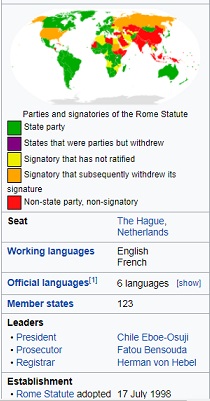(HOT) UPSC Current Affairs 2025 PDF
NEW! The Gist (JAN-2026) | E-BOOKS
International Criminal Court – It’s Future : Important Topics for UPSC Exams

International Criminal Court – It’s Future : Important Topics for UPSC Exams
News:
Philippines moves to quit International Criminal Court. There have been withdrawals in the recent past namely
About ICC
The International Criminal Court is an intergovernmental organization and international tribunal that sits in The Hague in the Netherlands.
The ICC has the jurisdiction to prosecute individuals for the international crimes of genocide, crimes against humanity, and war crimes.
The ICC is intended to complement existing national judicial systems and it may therefore only exercise its jurisdiction when certain conditions are met, such as when national courts are unwilling or unable to prosecute criminals or when the United Nations Security Council or individual states refer situations to the Court.
The ICC began functioning on 1 July 2002, the date that the Rome Statute entered into force. The Rome Statute is a multilateral treaty which serves as the ICC's foundational and governing document. States which become party to the Rome Statute, for example by ratifying it, become member states of the ICC. Currently, there are 123 states which are party to the Rome Statute and therefore members of the ICC.
India (also US and China) has neither signed nor ratified the Rome Statute on the International Criminal Court (ICC)
Recent withdrawals include Burundi, Russia etc.

UPSC General Studies PRE Cum MAINS Printed Study Material
Online Crash Course for UPSC PRE Exam
Reasonsfor Philippines stance
The ICC announced on February a preliminary examination into allegations Philippine police have killed thousands of alleged users or dealers as part of Duterte's anti-drug war that he launched after taking office in mid-2016.
However the withdrawal from the ICC only takes effect after a year from notification and therefore ICC can still investigate the cases.
Problems with the ICC
-
Bureaucratic structure
-
Procedural and substantive deficiencies have marred the work of the court, leading to lengthy delays and frustration
-
Its effectiveness has been questioned because of the pace with which it completes the cases : international tribunals’ inefficiency may ultimately undermine whatever deterrent effect they have on the world’s most malevolent wrongdoers.
-
Scarcity of human and financial resources.
-
Question of its legitimacy : The Prosecutor continues to face criticism over selection of situations and cases. There are allegations that the court is only investigating and prosecuting African cases; the majority of these situations have arisen from self-referrals or where non-member States have accepted the Court’s ad hoc jurisdiction.
-
Only two of the permanent members of the UN Security Council are members of the Court, yet the Security Council can refer situations to the Prosecutor, with no effective follow-up.
India and the ICC
-
India has not been its part for reasons related to absence of provisions whereby the state could accept the jurisdiction of ICC by declaration for a limited conduct and for a specified time. Absence of such a provision amounts to threat of sovereignty.
-
India has anxieties regarding how investigation, prosecution and criminal proceedings will be judged by the international court.
-
The inclusion of armed conflict (not of international nature ) in the list of war crimes is a cause of concern for India with respect of conflicts in Kashmir, North east and other regions of India.
-
Court might be biased and might run with political motives of international order.
Way forward
-
States should actively encourage cooperation and sanction non-cooperation.
-
States Parties should support human rights defenders working towards international justice and the fulfilment of the ICC’s mandate and implement all necessary measures to protect them
-
Increased universality: The court needs to broaden its ambit and include more permanent members of UN into its fold to establish credibility.
-
States have an obligation to cooperate with the ICC as it does not have its own police force. The Court suffers cruelly from the insufficient cooperation of the States, which weakens its authority and efficiency hence the financial and manpower issues need to be addressed.
-
Strengthening of investigations and prosecutions.
-
Support for participation and effective presentation of victim.
MODEL QUESTIONS :
Prelims Question
1. Which of the following statements regarding international criminal court is/are correct
A. The court is based in Netherlands.
B. The court is part of the UN system.
C. It was established by Rome statute.
Choose from above
-
A and B
-
B and C
-
A and C
-
All of the above
Correct Answer: c ( A and C)
2. Which of the following country is/are not part of the Rome statute
A. India
B. USA
C. China
D. Burundi
Choose the correct option
-
A and B only
-
B,C and D only
-
A, C and D only
-
All of the above
Correct Answer: d (All of the above)
Mains Questions

